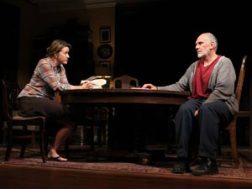Review: The Intelligent Homosexual's Guide to Capitalism and Socialism with a Key to the Scriptures

If the title of Tony Kushner’s new play premiere puts you off, wait until you actually sit through it. The overlong and overstuffed The Intelligent Homosexual’s Guide to Capitalism and Socialism With a Key to the Scriptures is typically Kushnerian in its seriousness, intelligence and wide-ranging themes, but this naturalistic drama is not nearly as effective as such works by the playwright as Angels in America or Homebody/Kabul.
Strongly reminiscent of Arthur Miller, the three-act work is mainly set in the Carroll Gardens neighborhood of Brooklyn, in a brownstone owned by Gus Marcantonio (Michael Cristofer), an avowed Communist and former longshoreman who has settled into a financially comfortable retirement.
Patriarch Gus has gathered his sister (Brenda Wehle) and grown children together to announce his plans to commit suicide, which he has attempted once before. He’s convinced that he’s suffering from Alzheimer’s disease, and is planning on selling his home to ensure financial security for his family.
The widowed Gus’ children, including oldest son Phil (Stephen Spinella), younger son V, short for Victor (Steven Pasquale) and daughter Empty (Linda Emond), are naturally aghast to hear of their father’s plans. Meanwhile, each is coping with various personal issues.
Phil, who has been in a longtime relationship with his African-American partner Paul (K. Todd Freeman), has spent a small fortune on the services of a male hustler (Michael Esper) with whom he is desperately in love. Empty is about to have a child via a surrogate (Molly Price) with her female lover Maeve (Danielle Skraastad) while enjoying the occasional sexual dalliance with her loyal ex-husband Adam (Matt Servitto). And working class V, married to the Asian-American Sooze (Hettienne Park), can barely contain his anger over his father’s decision.
The densely packed work—the title of which is a riff on writings by George Bernard Shaw and Mary Baker Eddy--offers a surfeit of characters and situations, more than Kushner can comfortably handle. Although it reveals the playwright’s gift for blending sexual, political and social issues with his trademark intelligence and biting humor, too much of the evening is composed of overheated domestic arguments.
These quickly prove tedious, especially in the overlong (3 and 3/4 hours) play’s second act, in which director Michael Greif has the actors loudly shouting while stepping over each other’s lines in a manner akin to the films of Robert Altman.
While some scenes resonate with dramatic power, the attenuated proceedings are mainly indicative of the playwright’s oft-demonstrated propensity for self-indulgence.
Performing on a beautifully detailed, two-story set designed by Mark Wendland, the ensemble, several of whom are veterans of previous Kushner productions, provide vividly memorable characterizations. Particularly outstanding are Spinella, who brings humor as well as desperation to Phil; Emond, who makes Empty sympathetic despite her selfish behavior; and Cristofer, who brings compelling forcefulness to his turn as the fervently leftist Gus.
Kushner’s undeniable talent is well on display in this ambitious but frustratingly problematic work. But it’s hard not to wish that the playwright had more sharply honed it since its Guthrie Theater premiere two years ago.
Public Theater, 425 Lafayette St. 212-967-7555. www.publictheater.org.
| Print article | This entry was posted by Frank on 05/06/11 at 05:56:22 am . Follow any responses to this post through RSS 2.0. |